Euro 2020: Budapest - the host city enjoying a summer renaissance
- Published
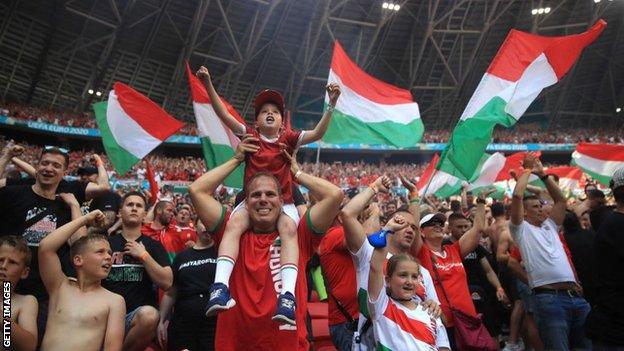
Uefa says 61,000 tickets have been issued for each game at the Puskas Arena
Uefa Euro 2020 on the BBC |
|---|
Dates: 11 June-11 July. Venues: Amsterdam, Baku, Bucharest, Budapest, Copenhagen, Glasgow, London, Munich, Rome, Seville, St Petersburg. Coverage: Live on BBC TV, BBC Radio 5 Live, iPlayer and the BBC Sport website and app. Click here for more details |
It was almost the shock of Euro 2020 so far, played in front of a capacity crowd and inspired by raucous and feisty home fans.
Hungary drew 1-1 with world champions France at the Puskas Arena in Budapest on Saturday as more than 60,000 people created an atmosphere befitting of the hosts' dogged performance.
Four days earlier, the Magyars had held defending champions Portugal for 84 minutes before slipping to a 3-0 defeat and this time they led before being pegged back in the heat.
Supporters can now look forward to two further games in the Hungarian capital - France's crucial clash with Portugal in the group and one of the last-16 ties.
It is proving something of a summer renaissance for a city that helped produce one of the most talented generations the world has witnessed, had a hand in the formation of the European Cup and whose coffee houses played host to the game's early deep-thinking tacticians.
Under Italian coach Marco Rossi, the former Brescia and Sampdoria defender, Hungary are experiencing a revival and have given themselves hope of progressing from a daunting group heading into their final fixture with Germany on Wednesday.
BBC Sport takes a look at what makes Budapest such a footballing hotbed.
A decline from the golden days
Pal Orosz, the chief executive of Ferencvaros, knows all about Hungarian football's glory days. His father, also called Pal, was a part of them, playing for the club as they won the 1965 Inter-Cities Fairs Cup, the forerunner to the Uefa Cup and the Europa League.
"My father passed away a few years ago - he was a club legend," Orosz told BBC Sport earlier this season. "I said: 'What happened to Hungarian football? You guys, in the 60s, you won everything - you beat Liverpool, Juventus…'"
From a footballing perspective, the nation was in its prime in the 1950s. The 'Golden Team' became Olympic champions in 1952, beat England 6-3 a year later in front of 105,000 people at Wembley in a game dubbed 'Match of the Century' and thrashed them 7-1 in a return fixture in Budapest in 1954.
They should have won the 1954 World Cup too, taking a 2-0 lead against West Germany, only to slip to a 3-2 defeat.
That same year, the great Honved side that was the nucleus of the national team were beaten in a friendly at Molineux by Wolverhampton Wanderers and the English media declared them "champions of the world", much to L'Equipe editor Gabriel Hanot's distaste.
The Frenchman, also behind the formation of the Ballon d'Or, was pivotal in convincing Uefa to create a European Cup, though neither Wolves nor Honved would play in its inaugural season.
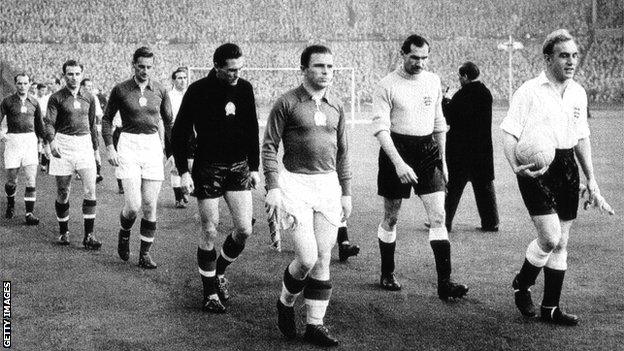
Hungary beat England 6-3 at Wembley in 1953, and 7-1 in Budapest the following year
Instead the great Honved side, which was then their national army team, would soon fall apart after the Hungarian Uprising in 1956 saw the domestic league cancelled.
The suppression of the revolt, and the invasion of Soviet troops, led to the break-up of the Honved team. Their finest talent left, as Ferenc Puskas joined Real Madrid and Sandor Kocsis moved to Barcelona.
Ferencvaros would carry the torch for Hungarian football on the continent, winning the Fairs Cup in 1965 against Juventus and losing to Leeds United in the final three years later, while also boasting a Ballon d'Or winner in legendary forward Florian Albert in 1967.
"At the end of the 60s, in Western Europe, some people realised football was not only a sport but a branch of the entertainment business," said Orosz.
"They chose clubs that were really supported by the masses and they built them as brands.
"But here, in this region, it was state football - and the gap opened. Now the gap is so big that we will probably never catch up."
Packed crowds & Kiraly's sweatpants
Ferencvaros have just won their third successive Hungarian title and this season reached the group stages of the Champions League for the first time since 1995-96.
They play at the Groupama Arena but staged games against Barcelona and Juventus at the Puskas Arena, which is hosting 61,000 fans per match during the Euros - the only venue of the 11 at the tournament where there are plans to have 100% capacity for every game.
It was a decision that was met with a mixed reaction in Hungary.
"The timing of the announcement was quite bizarre when the death rate in Hungary was the worst in the world per capita. People were gobsmacked," says Gaby Kovacs, host of the Hungarian Football Podcast.
"But Hungary is desperate to shine on this stage, so it would be quite a spectacle to see it full up. The Hungarian fans and the ultras are so vociferous, so the atmosphere will be phenomenal.
"The stadium is fantastic and it will be great to see it packed with fans again, especially when the national team is in a better place than it has been for many moons."
Hungary reached the last 16 at the European Championship five years ago - their first major tournament since the 1986 World Cup. Such was the excitement that students - and some teachers - wore sweatpants into their exams, external as a nod to the kit of goalkeeper Gabor Kiraly.
"People were really nuts in 2016 because we were doing so well and it sort of came out of nowhere," said Hungarian journalist Aron Aranyossy.
"The whole country was excited, people were celebrating on the streets, everybody was super into it. Now to have France and Portugal in front of you is a special occasion. It's the real deal and very exciting."
Hungarian football writer Tomasz Mortimer predicts a colourful display from the returning locals.
"There'll be loads of flares and smoke bombs, a lot of choreographed singing and dancing," Mortimer said. "It will be just a lively party atmosphere with the traditional Eastern European anger that goes with it, but a happy mix of the two. It will be incredible."
'On a dingy rack, you'll find Hungarian shirts'
That enthusiasm for the national team has failed to seep through to the domestic league, however, with pre-pandemic crowds dwindling at most clubs apart from Ferencvaros, who are supported by 20% of the Hungarian population, according to a recent study.
The Green Eagles are now the dominant domestic force - as they are in Budapest, a city that boasts six clubs to have won the top flight: Ferencvaros, MTK, Ujpest, Honved, Vasas and Csepel.
"It is a football-mad country, but it tends to be more foreign football they are interested in because the product here is not particularly great," says Kovacs.
"In Budapest alone, you could walk through the streets and see Chelsea and Manchester United shirts, then maybe on a rack in a dingy corner, you'll find some Hungarian shirts."
The government has poured money into the game to try to attract fans back, while the state broadcaster now shows matches on free-to-air television.
"The stadiums were in a state of disrepair all over Hungary and so the government invested loads of money and built brand new stadiums for lots of clubs," said Kovacs.
"They're finely polished, beautiful looking, they're enormous, but no-one goes still. It's not done anything to attract fans back.
"As good as these new stadiums look, they're not a patch on the ones that were falling apart.
"For me, as a Honved fan, going into the old stadium - and knowing it's exactly the same as the one Puskas and all those guys played in - kind of took your breath away."
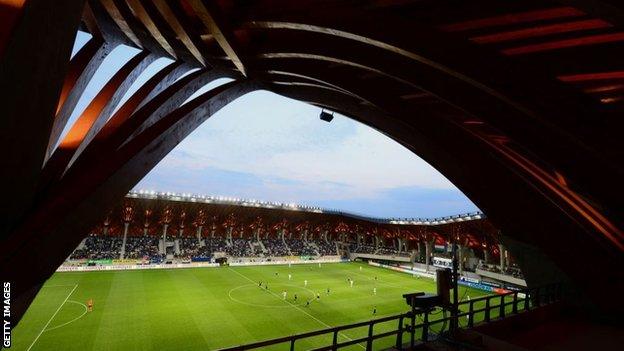
The Pancho Arena in Felcsut was opened in 2014
Behind the investment is football-obsessed Prime Minister Viktor Orban, who watched the Puskas Akademia side he co-founded in 2007 finish second behind Ferencvaros in the top division this season.
It is not known whether Puskas ever stepped foot in Felcsut - the small village where Orban once played semi-professional football, a 40-minute drive from Budapest. But the club carries the forward's name and the stadium one of his nicknames.
The Pancho Arena, built close to the estate where Orban lived as a child, was opened in 2014. Its 3,500 capacity is more than double the population of the village.
"It must be very interesting to play for them, as everybody hates them because it wasn't organic at all," Aranyossy said.
"It came out of nowhere and the lack of fans shows that. People see it as just Orban's thing.
"The Honved supporters are really mad because they bought the use of Puskas' name, but also got their hands on every part of his heritage from Spain.
"His heritage is in a town he probably never heard of. His shoes, contracts, medals and a lot more is there.
"He was a Honved great and they were upset because they took everything connected to him - one year, away fans weren't even allowed to take a flag with his name on."
'One of Europe's fiercest derbies'
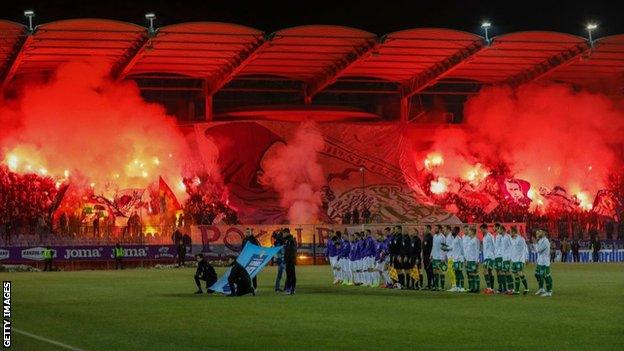
Ujpest versus Ferencvaros is Hungary's biggest derby
Low attendances are a problem at league games in Hungary, but the derby between Ferencvaros and Ujpest remains one of the most-anticipated matches on the calendar and fans pack out the ground to witness it.
"It's almost a mini Partizan versus Red Star Belgrade, that kind of ferocity, what they call the Eternal Derby in Serbia, but to a lesser level," Mortimer said.
Kovacs says the clubs have recently banned ultras from visiting each other's grounds in a bid to stem crowd violence.
"It's one of the fiercest derbies you'll see in Europe," he added. "The hatred between them is horrendous. It often spills over into mass violence, grounds being destroyed.
"It's the biggest game in Hungary. Everyone looks forward to it. You look forward to watching the choreography from the home and away end."
But they are the only clubs in the city to share such an intense rivalry.
"Kispest, where Honved are based, is a very small suburb of Budapest in the south east and so relies on the local community," said Kovacs, whose father supported the club because he was in the Hungarian army.
"In the suburbs, MTK are a fantastic club and a lot of people's second team, but historically they were assigned to the secret police under communism, so for that reason, they didn't have a lot of fans."
Kovacs would encourage anyone to visit MTK's Nandor Hidegkuti Stadium, named after Hungary's legendary false nine who scored a hat-trick in their famous Wembley win against England. It hosts 5,000 fans and is renowned for its large concrete walls behind either goal.
"It's the most fantastic place you'll go to see football, a brand new and completely bizarre stadium," Kovacs said.
"Even second and third division football is fantastic in Hungary, in some of the most scenic locations you will ever go to - enormous, bowl stadiums with massive stands. It's phenomenal and so accessible."
However, some clubs are still grappling with racist and anti-Semitic abuse from sections of their support. Hungary's football association was sanctioned by Uefa during Euro 2020 qualifying for racist behaviour by their supporters, and a number of fans booed Republic of Ireland players taking the knee before their recent friendly.
Time to shine again?
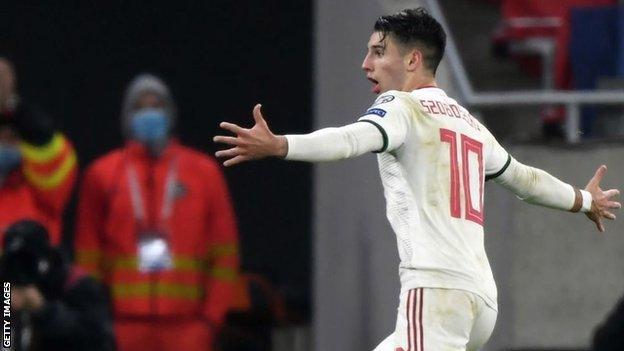
Dominik Szoboszlai, who scored the goal that took Hungary to the European Championship, is missing the finals because of injury
The impact of government investment has been to make the league one of the richest in the region, meaning clubs can attract higher-profile players and coaches. Former Tottenham, West Ham and Ukraine striker Sergei Rebrov had a spell as manager of Ferencvaros, while Poland boss Paulo Sousa was in charge of Videoton in the early 2010s.
"It's helped the Hungarian players in the league because they're competing against better players each week," said Mortimer. "It's made everyone just enjoy watching the league a lot more as well, because it used to be drab.
"They are putting a lot of money into development too, but I think the jury's out whether it's working or not at the moment."
RB Leipzig playmaker Dominik Szoboszlai is Hungary's standout star, but is missing the finals because of injury.
There is a debate about whether he was "produced" in Hungary, having moved to Austria when he was 16, and a lot of the country's brightest young talent tends to head abroad when the opportunity arises.
"Honved have a fantastic academy and a really good turnover of players," said Kovacs.
"The players get to an age where they are showing potential, 19, 20, 21, and the only thing they want to do is get out of the country and play in another league."
Of the 26-man squad named for the European Championship, 14 live in Hungary, with the rest stationed around Europe and two - Daniel Gazdag and Szabolcs Schon - in Major League Soccer.
But whether plying their trade at home or abroad, it is in Budapest - at the stadium baring the name of the country's greatest export - that Hungary's current crop are impressing this summer.
A version of this article was first published on 15 June.